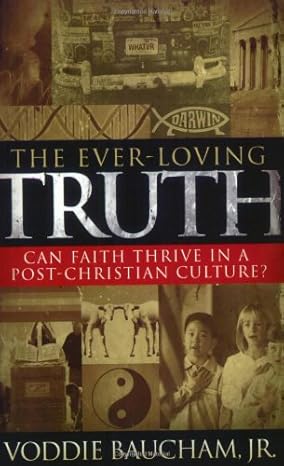A Book Review from Books At a Glance
by Codey A. Cline
Within the middle of a PhD seminar on theology and culture, Baucham’s updated version of The Ever-Loving Truth provides a beginner’s handbook for handling the many issues Christians will face while navigating cultural engagement in a time and place where truth itself is subjective, much less the assertion that Scripture is truth. The author sees a parallel experience between Christians living in the West with Peter and John before the Sanhedrin in Acts 4. Rather than capitulate to the culture, as Baucham believes the American church has begun to do, the author presents a three-part argument for how Christians can remain faithful today.
The first section of the book argues for the existence of absolute truth as opposed to the postmodern assertion for subjectivism. Christians must be people who believe truth really exists. Someone is telling the truth, and someone is not. The author suggests that claiming such reality will necessarily have Christians outside of mainstream thought, just as Peter and John found themselves to be. The greatest offense in Western culture is to tell someone their thoughts or feelings are wrong, but this is what Christians must do. Within this section, Baucham gives small sections to equip the reader with responses for people they will engage who do not believe in absolute truth. He closes the section by recognizing how Jesus is being removed from the public square, and how Christians can expect to be maligned for continuing to keep Jesus at the forefront of our message.
The second section implores the continued preaching of the gospel no matter what response is received. However, Baucham equips the reader for contemporary evangelism by recognizing spiritual encounters outside of Christian experiences. The author notes that everyone has a story, and quite possibly has a tale of victory or self-fulfillment that does not include faith and repentance. In true Baucham-style, the author prepares the Christian to press into Scripture for validation of a conversion experience. Not only does the evangelist have the Scriptures for a judge, but they also have countless other individuals whom God has converted through Christ to see how He operates in the lives of man. The standard result of God’s work is faith in Jesus Christ and repentance from sin. Baucham prepares the Christian to expect suffering as the gospel is preached and to welcome such suffering when it comes.
The final section of the book is largely apologetic. It begins with a defense of the Bible and the various reasons Christians have for its trustworthiness. Proceeding from there, Baucham presents the Jesus of the Bible in opposition to the pseudo-Jesuses which the modern mind can create to fit the cultural narrative. Sin is still a reality which separates man from God, and which warrants God’s wrath. Jesus, the Son of God, came to bear our sin and glorify the Father. This Jesus cannot be reconciled with Islam, Mormons, Jehovah’s Witness, or Jewish theology. We do not all hold to the same religion in different forms. In contending for the faith, however, Christians would do well to argue well with a love for the people over a desire to win. Baucham’s encouragement is for the believer to remember their own sinfulness, which identifies them with the lost, and to remember their Savior, who must call sinners to Himself to be born again. Ultimately, we are instruments in His hands to reach a lost world.
Baucham’s conclusion gives many areas where Christians will need to be faithful, such as politics, science, and higher education. Ultimately, Baucham advocates for a Christian presence in these disciplines without demanding success within them in order to remain faithful. I enjoyed reading the book and will recommend it to church members seeking to answer questions from unbelievers that they encounter in daily life. Baucham’s arguments for the reliability and trustworthiness of the Bible are critical for the common believer to properly defend their hope in Christ in a post-Christian world.
One area that Baucham could improve on is envisioning a future where some ideology prevails over the current preference for personal liberty. Paganism as a growing ideological threat has been picked up by other scholars such as Daniel Heimbach in True Sexual Morality (Wheaton: Crossway, 2004). Some ideology has to win the day, and it is likely that, if the Lord tarries, paganism and alternate spiritualities will be a growing threat to warn believers. While Baucham does acknowledge the reality of ‘testimonies’ outside of the Christian experience of conversion on the rise, he lacks space for answering those who claim these experiences outside of connections to Christianity.
Baucham is a treasure to the church today for his unwavering reliance upon Scripture in light of the challenges faced today. This book serves as a guide for believers looking to faithfully defend the Bible and Christian beliefs in a time where both are maligned. The author provides great starting points for engaging with unbelievers and for strengthening a believer’s confidence that God is still speaking through His Word today.
Codey Cline
